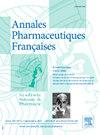Élaboration d’un indicateur coût-satisfaction dans le suivi des dispositifs médicaux implantables en prêt et dépôts permanents
IF 1.1
Q4 PHARMACOLOGY & PHARMACY
引用次数: 0
Abstract
Les dispositifs médicaux implantables (DMI) des blocs opératoires de notre hôpital sont gérés en dépôts permanents. Récemment une évolution des pratiques des fournisseurs semble limiter l’ouverture des dépôts permanents à la faveur des prêts itératifs. Leur multiplicité semblerait complexifier les flux de DMI. L’objectif de ce travail était d’estimer les coûts des circuits en y associant la satisfaction ressentie des principaux intervenants. Les flux de dépôts et de prêts du bloc d’orthopédie ont été analysés rétrospectivement sur une année. En parallèle, de façon prospective, les volumes horaires attribuées à la gestion des dépôts permanents et temporaires ont été relevés pour les préparateurs et les cadres de blocs. Une enquête de satisfaction a été proposée à tous les acteurs : préparateurs, cadres, pharmaciens, chirurgiens, infirmiers et fournisseurs. Le coût rapporté à une unité DMI gérée en dépôt permanent s’élève à 1,89 € contre 2,66 € en prêt. La satisfaction globale pour une gestion en dépôt s’élève à 81 % contre 55 % pour un même implant géré par prêt (p < 0,001). En outre, un implant en prêt s’avère 68 % plus onéreux pour l’établissement lorsque le coût unitaire est pondéré par la satisfaction (4,84 € vs. 2,33 €). La gestion des DMI par prêt s’avère ainsi plus coûteuse pour l’hôpital. Cette différence se creuse en intégrant le critère de satisfaction professionnelle dans tous les corps de métiers impliqués sur les flux de DMI. L’étude réalisée ne concerne que des points spécifiques de la gestion des DMI sur le terrain (renouvellement, étiquetage, périmés et retours). Aucune étude similaire n’a été retrouvée dans la littérature. Le recours au prêt pèse de plus en plus lourd sur les intervenants, générant du stress et un travail parfois démotivant avec un manque de reconnaissance.
The implantable medical devices (IMDs) in the operating rooms of our hospital are managed through permanent deposits. Recently, a shift in supplier practices seems to limit the opening of permanent deposits in favor of iterative loans. Their increasing number appears to complicate the flow of IMDs. The aim of this study was to estimate the costs associated with these circuits while considering the satisfaction of the key stakeholders involved. The flows of deposits and loans in the orthopedic operating room were analyzed retrospectively over the course of a year. In parallel, a prospective assessment was made of the hours dedicated to managing both permanent and temporary deposits by the preparers and operating room managers. A satisfaction survey was conducted for all stakeholders: preparers, managers, pharmacists, surgeons, nurses, and suppliers. The cost per unit of IMD managed through permanent deposit is €1.89, compared to €2.66 for loans. The overall satisfaction for deposit management is 81%, compared to 55% for the same implant managed through loans (P < 0.001). Furthermore, an implant in loan proves to be 68% more expensive for the hospital when the unit cost is weighted by satisfaction (€4.84 vs. €2.33). Managing IMDs through loans is thus more costly for the hospital. This difference becomes even more pronounced when professional satisfaction is factored into all the roles involved in the IMD flows. This study focuses specifically on aspects of IMD management on the ground (renewals, labeling, expired items, and returns). No similar studies were found in literature. The reliance on loans is increasingly burdensome for stakeholders, generating stress and sometimes demotivating work due to a lack of recognition.
[为监测借用和永久储存的植入式医疗器械制定成本满意度指标]。
本院手术室植入式医疗器械实行永久存放管理。最近,供应商做法的转变似乎限制了永久存款的开放,而倾向于反复贷款。它们数量的增加似乎使imd的流动变得复杂。本研究的目的是评估与这些电路相关的成本,同时考虑所涉及的关键利益相关者的满意度。回顾性分析骨科手术室一年来的存款和贷款流动情况。同时,对筹备人员和手术室管理人员用于管理永久和临时存款的时间进行了前瞻性评估。对所有利益相关者:编制人员、管理人员、药剂师、外科医生、护士和供应商进行了满意度调查。通过永久存款管理的每单位IMD成本为1.89欧元,而贷款为2.66欧元。存款管理的总体满意度为81%,而通过贷款管理的相同植入物的总体满意度为55% (p < 0.001)。此外,如果以满意度作为单位成本权重(4.84欧元对2.33欧元),植入物贷款对医院来说要贵68%。因此,通过贷款管理imd对医院来说成本更高。当将职业满意度纳入IMD流程中涉及的所有角色时,这种差异变得更加明显。本研究特别关注IMD管理的各个方面(续订、标签、过期物品和退货)。文献中未见类似研究。对贷款的依赖给利益相关者带来了越来越大的负担,带来了压力,有时还会因为得不到认可而使工作失去动力。
本文章由计算机程序翻译,如有差异,请以英文原文为准。
求助全文
约1分钟内获得全文
求助全文
来源期刊

Annales pharmaceutiques francaises
PHARMACOLOGY & PHARMACY-
CiteScore
1.70
自引率
7.70%
发文量
98
期刊介绍:
This journal proposes a scientific information validated and indexed to be informed about the last research works in all the domains interesting the pharmacy. The original works, general reviews, the focusing, the brief notes, subjected by the best academics and the professionals, propose a synthetic approach of the last progress accomplished in the concerned sectors. The thematic Sessions and the – life of the Academy – resume the communications which, presented in front of the national Academy of pharmacy, are in the heart of the current events.
 求助内容:
求助内容: 应助结果提醒方式:
应助结果提醒方式:


